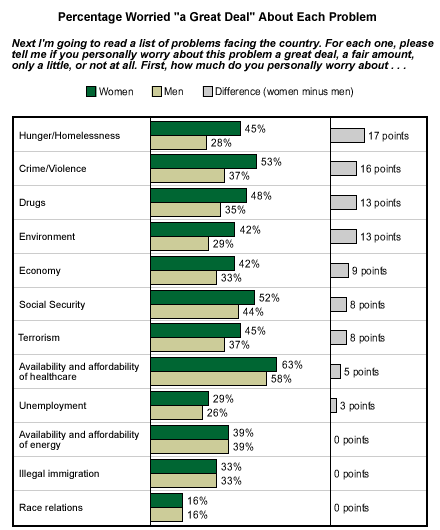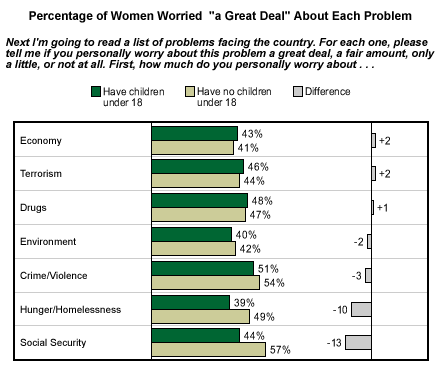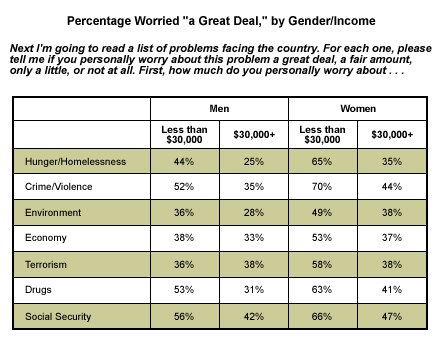Are women born worriers?
Each year in March, Â鶹´«Ã½AV measures the degree to which Americans are concerned about various U.S. domestic policy issues. While levels of concern can change from year to year, one finding remains constant: women tend to express higher degrees of worry than men do. This inevitably leads to the question: Are women more troubled by societal problems, more prone to anxiety in general, or simply more comfortable admitting they worry?
In this year's survey*, women were significantly more likely than men to say they worry "a great deal" about 7 of the 12 issues tested. The gender gaps are particularly large for hunger/homelessness and crime -- 17 points and 16 points, respectively. Significant gaps are also evident for drug use, the environment, the economy, Social Security, and terrorism. On no issue are men significantly more worried than women.

Women and Anxiety
To determine whether these gaps really do indicate a higher level of anxiety among women about the problems, as opposed to a gender-role difference in men's versus women's willingness to confess anxiety, we must look at some other data.
A study reported two years ago in the journal Psychiatric Genetics found a significantly higher propensity toward anxiety among women than men. The study involved clinical research measuring brainwaves and DNA blood samples in men and women -- thereby sidestepping the problem of differential propensities to admit anxiety.
Does this finding also explain why Â鶹´«Ã½AV polling from 2003 and 2004 shows women are slightly more likely than men to say they experience stress? Thirty-nine percent of women say they are frequently stressed, compared with 32% of men. So, it's possible that women are just wound a bit more tightly, and therefore are more likely to feel anxious about some social problems.
In fact, according to the Mayo Clinic, not only are women about twice as likely as men to experience clinical depression in their lives, they're also significantly more likely to experience generalized anxiety disorder. "Women are very anxious," observes someone who spends a lot of time with women -- a 42-year-old hairdresser from New Jersey. "A lot of the women I know take medication for anxiety. I do, too. Before I started taking Zoloft," she says, referring to a drug used to treat both depression and anxiety, "I worried about everything."
Cultural Role
Cultural roles offer a possible explanation; specifically, motherhood may cause women to be more sensitive to societal problems. "I think women look at things from a very maternal perspective -- they want to know how things like crime, drugs, the environment, and the economy will affect their own children," says a 40-year-old mother of two from Florida. "Also, I'm concerned a great deal about social issues like hunger and homelessness and I want my children to be aware that others aren't as lucky as we are."
If maternity was the predominant explanation, one might expect to see women with children under 18 at home showing more concern than other women. That's not the case; there are only slight differences between women with and without children under 18. Where there is a significant difference -- as seen with worry about hunger/homelessness and Social Security -- it is women without young children who are more worried.

It could certainly be the case that all mothers -- those with grown children as well as those with young children -- share the psychological traits that would affect their tendency to worry. Thus a further line of research (not possible with the current data) would compare the attitudes of all mothers to women with no children.
Income
The fact that women, on average, have lower incomes compared with men, may also help explain why women are more sensitive to some social problems. This hypothesis is supported to some degree by Â鶹´«Ã½AV's data. Overall, respondents in lower-income households are more likely to say they worry about drug use, the environment, the economy, and Social Security. Because more women than men fall into the lower-income category of $30,000 or less a year (32% of women versus 21% of men), it therefore holds that income is a significant explanatory variable in the worry gap between men and women.
Furthermore, income seems to make a bigger difference among women than men when it comes to worrying. Lower-income women are significantly more worried than women in higher-income households about several problems -- hunger, crime, the economy, the environment, drugs, and Social Security. This income pattern is seen to a lesser degree with men.

Bottom Line
Still, lower-income women are more worried than lower-income men about the problems Â鶹´«Ã½AV examined -- so income is not an overriding explanatory factor. There is something about women (especially lower-income women) that makes them prone to worry.
Several respondents indicated they feel that "something" is a combination of nature and nurture -- psychological differences formed to address different social roles. "I think men are programmed not to worry about things they can't control," says a 55-year-old male respondent. "They're more focused on the immediate things they have to do to take care of their families."
The Florida mom quoted earlier has a similar idea. "I think women are hardwired differently -- they are more compassionate and they see a broader perspective than men," she says. "They have to, because they juggle so many activities and issues every day."
*These results are based on telephone interviews with a randomly selected national sample of 1,004 adults, aged 18 and older, conducted March 7-10, 2005. For results based on this sample, one can say with 95% confidence that the maximum error attributable to sampling and other random effects is ±3 percentage points. In addition to sampling error, question wording and practical difficulties in conducting surveys can introduce error or bias into the findings of public opinion polls.
